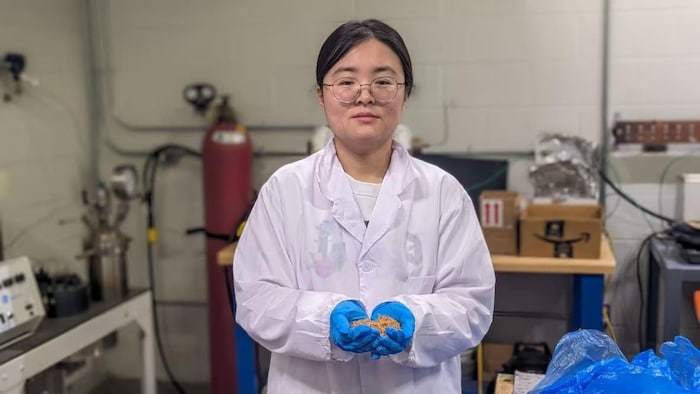Open in full screen mode Yulin Hu, an assistant professor at UPEI's Faculty of Sustainable Design Engineering, is one of the scientists researching new ways to produce hydrogen, including from biowaste. Radio-Canada Speech synthesis, based on artificial intelligence, makes it possible to generate spoken text from a written text. Researchers from the University of Prince Edward Island have received a federal grant to continue their work on the valorization of certain waste. The goal is to successfully generate biofuels and products capable of capturing CO2. When you process potatoes, you will generate a lot of waste, says Yulin Hu, assistant professor at UPEI's Faculty of Sustainable Design Engineering, referring to the province's main agricultural industry. Scientist seeks solutions to replace fossil fuels and fight climate change. In this context, she is interested in the waste of everyday life that is wasted, and more particularly in potatoes. In her laboratory, she succeeded in transforming the tubers into raw material, in order to produce hydrogen. The simulation results show us that potato waste is a promising raw material that we could use and convert into hydrogen, she explains.< /p>Loading ELSE ON INFO: Evacuations and rivers under surveillance in the greater Quebec region The Natural Sciences and Engineering Research Council of Canada awarded him a grant of $142,500 over five years to move from simulation to building a machine to produce biofuels and products that can capture CO2 from biowaste. Yulin Hu hopes to carry out the first trial next year. Potatoes aren't the only option tested in the UPEI lab. Sawdust could absorb CO2, while tunicates , an invasive species that attacks mussel farms, could be transformed into biofertilizer. We are trying to convert all kinds of organic waste and then convert it into a product that could potentially benefit the province. A quote from Yulin Hu, Faculty of Sustainable Design Engineering of Other scientists at the university are working on the production of hydrogen from solar energy, using ultraviolet rays. With information from CBC .
Evacuations and rivers under surveillance in the greater Quebec region
UPEI scientists produce hydrogen from leftover potatoes

